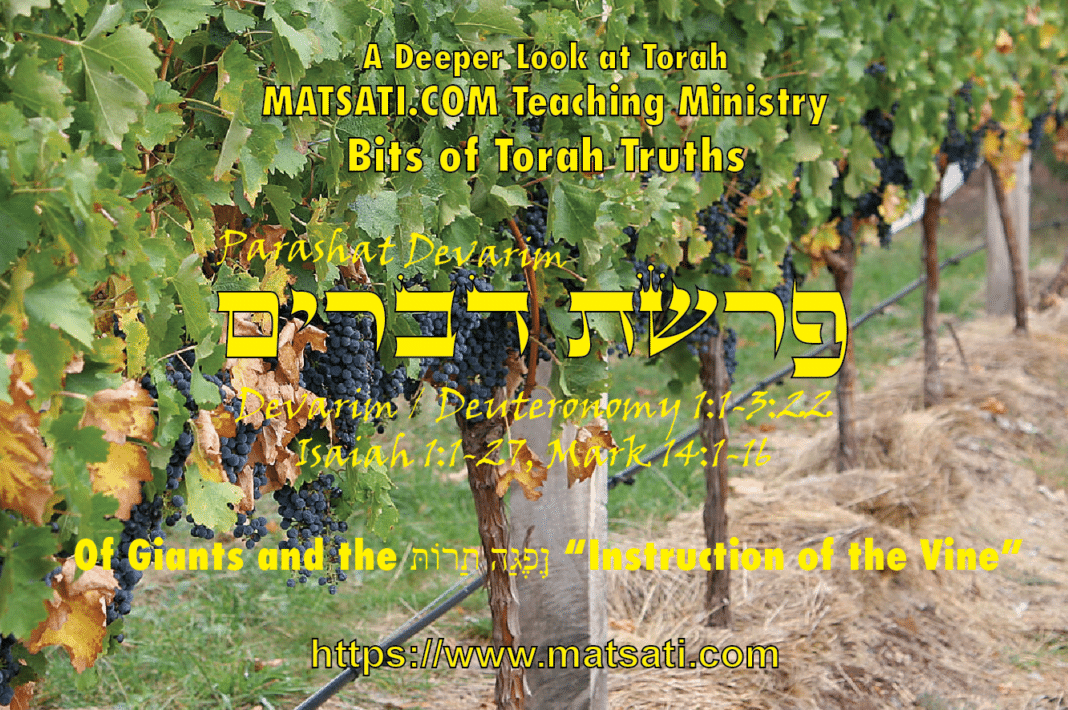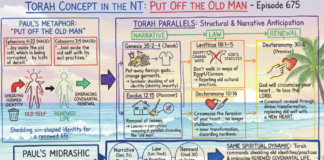This week’s Torah Portion is the opening portion for the book of Deuteronomy, Parashat Devarim. The first few chapters recount the travels and the conquests of Israel prior to and during their 40 year journey through the wilderness. There is an interesting comment that we read about Og King of Basham according to Devarim / Deuteronomy 3:8-11, ח וַנִּקַּח בָּעֵת הַהִוא אֶת-הָאָרֶץ מִיַּד שְׁנֵי מַלְכֵי הָאֱמֹרִי אֲשֶׁר בְּעֵבֶר הַיַּרְדֵּן מִנַּחַל אַרְנֹן עַד-הַר חֶרְמוֹן: ט צִידֹנִים יִקְרְאוּ לְחֶרְמוֹן שִֹרְיֹן וְהָאֱמֹרִי יִקְרְאוּ-לוֹ שְֹנִיר: י כֹּל | עָרֵי הַמִּישֹׁר וְכָל-הַגִּלְעָד וְכָל-הַבָּשָׁן עַד-סַלְכָה וְאֶדְרֶעִי עָרֵי מַמְלֶכֶת עוֹג בַּבָּשָׁן: יא כִּי רַק-עוֹג מֶלֶךְ הַבָּשָׁן נִשְׁאַר מִיֶּתֶר הָרְפָאִים הִנֵּה עַרְשֹוֹ עֶרֶשֹ בַּרְזֶל הֲלֹה הִוא בְּרַבַּת בְּנֵי עַמּוֹן תֵּשַׁע אַמּוֹת אָרְכָּהּ וְאַרְבַּע אַמּוֹת רָחְבָּהּ בְּאַמַּת-אִישׁ: 3:8 ‘Thus we took the land at that time from the hand of the two kings of the Amorites who were beyond the Jordan, from the valley of Arnon to Mount Hermon 3:9 (Sidonians call Hermon Sirion, and the Amorites call it Senir): 3:10 all the cities of the plateau and all Gilead and all Bashan, as far as Salecah and Edrei, cities of the kingdom of Og in Bashan. 3:11 (For only Og king of Bashan was left of the remnant of the Rephaim. Behold, his bedstead was an iron bedstead; it is in Rabbah of the sons of Ammon. Its length was nine cubits and its width four cubits by ordinary cubit.) (NASB) Here the Torah describes how Israel conquered the kings of the Amorites who are beyond the Jordan, the kingdom of Og, king of Bashan. It is interesting how the Torah describes Og the king of Bashon (עוֹג מֶלֶךְ הַבָּשָׁן) according to Devarim / Deuteronomy 3:11 saying, נִשְׁאַר מִיֶּתֶר הָרְפָאִים that he was left of the remnant of the Rephaim. This was quantified by the words הִנֵּה עַרְשֹוֹ עֶרֶשֹ בַּרְזֶל הֲלֹה הִוא בְּרַבַּת בְּנֵי עַמּוֹן תֵּשַׁע אַמּוֹת אָרְכָּהּ וְאַרְבַּע אַמּוֹת רָחְבָּהּ בְּאַמַּת-אִישׁ “behold his bed was a bed of iron, behold it was in Rabbah of the sons of Ammon, it was nine cubits long, and four cubits wide, like the cubit of a man.” Based upon this description, the length of this bed, if we can make an assumption that the king Og, his body length was approximately the length of the bed, nine cubits is equivalent to 13.5 ft (4.12 meters). This king was extremely tall, he was so big that he needed a bed of iron to sleep upon, something to be manufactured that could withstand his weight through the night. This reminds us of Goliath who was also described as being 4 meters and a span tall (see 1 Samuel 17). With a king and people this tall, it is not surprising the people of Israel were fearful of standing up against them to take their land and their homes. We also note how these conquests took place prior to the story of Bilam in Parashat Balak. Because these events occurred prior to Parashat Balak, the people of Moab heard about all that Israel had done to Sihon and Og and this is why we read according to Bamidbar / Numbers 22:3 and Moab was terrified because there were so many people. Indeed, Moab was filled with dread because of the Israelites. (NASB) Rabbeinu Bahya’s commentary on Devarim / Deuteronomy 3:11 states the following:
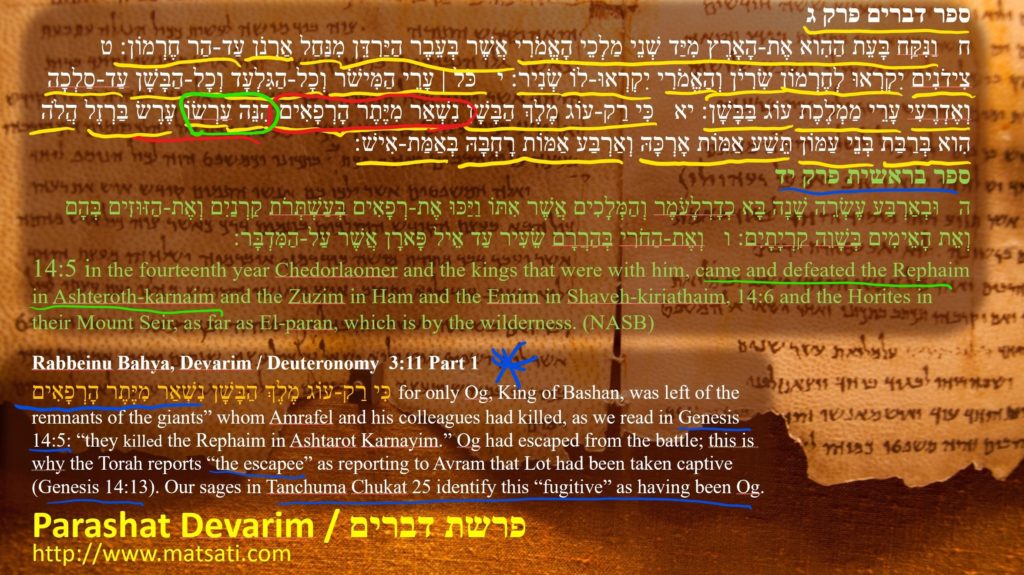
Rabbeinu Bahya, Devarim / Deuteronomy 3:11 Part 1
כִּי רַק-עוֹג מֶלֶךְ הַבָּשָׁן נִשְׁאַר מִיֶּתֶר הָרְפָאִים, “for only Og, King of Bashan, was left of the remnants of the giants” whom Amrafel and his colleagues had killed, as we read in Genesis 14,5: “they killed the Rephaim in Ashtarot Karnayim.” Og had escaped from the battle; this is why the Torah reports “the escapee” as reporting to Avram that Lot had been taken captive (Genesis 14,13). Our sages in Tanchuma Chukat 25 identify this “fugitive” as having been Og.
Notice how Rabbeinu Bahya on Devarim / Deuteronomy 3:11, Bereshit Rabbah 42:8, and Rashi on Bereshit / Genesis 14.13 Part 1 all connect Og king of Bashan to Bereshit / Genesis 14:5. Bereshit / Genesis 14:5-6, ה וּבְאַרְבַּע עֶשְֹרֵה שָׁנָה בָּא כְדָרְלָעֹמֶר וְהַמְּלָכִים אֲשֶׁר אִתּוֹ וַיַּכּוּ אֶת-רְפָאִים בְּעַשְׁתְּרֹת קַרְנַיִם וְאֶת-הַזּוּזִים בְּהָם וְאֵת הָאֵימִים בְּשָׁוֵה קִרְיָתָיִם: ו וְאֶת-הַחֹרִי בְּהַרֲרָם שֵֹעִיר עַד אֵיל פָּארָן אֲשֶׁר עַל-הַמִּדְבָּר: 14:5 In the fourteenth year Chedorlaomer and the kings that were with him, came and defeated the Rephaim in Ashteroth-karnaim and the Zuzim in Ham and the Emim in Shaveh-kiriathaim, 14:6 and the Horites in their Mount Seir, as far as El-paran, which is by the wilderness. (NASB) Note also Rabbeinu Bahya in part 2 on this verse states Onkelos alludes to the fact that Og was the only survivor of the descendants of Kayin whose giants had been introduced to us by the Torah in Bereshit / Genesis 6:2 as בני אלוהים. These mentioned in Bereshit / Genesis 6 were not angels cohabiting with humans and producing children as most Christians believe today. The verse speaks to Og, his size, his stature, and his strength, describing him as king of the Amorites who ruled over them and he was of the Raphaim. The rabbis describe these verses as “His bed was left there in Rabbah which now belongs to the children of Ammon, and the Ammonites preserved it as testimony that they destroyed a great and tall people; and the mighty man whose height was like the height of the cedars, and he was strong as the oaks, Amos 2:9. From him they captured his kingdom. This is the sense of the word behold [behold, his bedstead …], meaning: ‘behold, the proof of [Og’s strength] still exists; it is the iron bedstead, very long and wide, and is to be found in Rabbah of the children of Ammon,’ since his bedstead, which was in Ashtaroth, was plundered and lost.” Og is being described here as a very powerful man, along with his people, and we learn how God delivered them into the hands of Israel. These things reveal to us how anything is possible with the Lord, especially in the terms of danger and safety as the Lord is powerful to deliver us and keep us and help us to overcome our worst enemies no matter what the situation.
The verses we are looking at for this week are from Devarim / Deuteronomy 3.
ספר דברים פרק ג
א וַנֵּפֶן וַנַּעַל דֶּרֶךְ הַבָּשָׁן וַיֵּצֵא עוֹג מֶלֶךְ-הַבָּשָׁן לִקְרָאתֵנוּ הוּא וְכָל-עַמּוֹ לַמִּלְחָמָה אֶדְרֶעִי: ב וַיֹּאמֶר יְהוָֹה אֵלַי אַל-תִּירָא אֹתוֹ כִּי בְיָדְךָ נָתַתִּי אֹתוֹ וְאֶת-כָּל-עַמּוֹ וְאֶת-אַרְצוֹ וְעָשִֹיתָ לּוֹ כַּאֲשֶׁר עָשִֹיתָ לְסִיחֹן מֶלֶךְ הָאֱמֹרִי אֲשֶׁר יוֹשֵׁב בְּחֶשְׁבּוֹן: ג וַיִּתֵּן יְהֹוָה אֱלֹהֵינוּ בְּיָדֵנוּ גַּם אֶת-עוֹג מֶלֶךְ-הַבָּשָׁן וְאֶת-כָּל-עַמּוֹ וַנַּכֵּהוּ עַד-בִּלְתִּי הִשְׁאִיר-לוֹ שָֹרִיד: ד וַנִּלְכֹּד אֶת-כָּל-עָרָיו בָּעֵת הַהִוא לֹא הָיְתָה קִרְיָה אֲשֶׁר לֹא-לָקַחְנוּ מֵאִתָּם שִׁשִּׁים עִיר כָּל-חֶבֶל אַרְגֹּב מַמְלֶכֶת עוֹג בַּבָּשָׁן: ה כָּל-אֵלֶּה עָרִים בְּצֻרֹת חוֹמָה גְבֹהָה דְּלָתַיִם וּבְרִיחַ לְבַד מֵעָרֵי הַפְּרָזִי הַרְבֵּה מְאֹד: ו וַנַּחֲרֵם אוֹתָם כַּאֲשֶׁר עָשִֹינוּ לְסִיחֹן מֶלֶךְ חֶשְׁבּוֹן הַחֲרֵם כָּל-עִיר מְתִם הַנָּשִׁים וְהַטָּף: ז וְכָל-הַבְּהֵמָה וּשְׁלַל הֶעָרִים בַּזּוֹנוּ לָנוּ: ח וַנִּקַּח בָּעֵת הַהִוא אֶת-הָאָרֶץ מִיַּד שְׁנֵי מַלְכֵי הָאֱמֹרִי אֲשֶׁר בְּעֵבֶר הַיַּרְדֵּן מִנַּחַל אַרְנֹן עַד-הַר חֶרְמוֹן: ט צִידֹנִים יִקְרְאוּ לְחֶרְמוֹן שִֹרְיֹן וְהָאֱמֹרִי יִקְרְאוּ-לוֹ שְֹנִיר: י כֹּל | עָרֵי הַמִּישֹׁר וְכָל-הַגִּלְעָד וְכָל-הַבָּשָׁן עַד-סַלְכָה וְאֶדְרֶעִי עָרֵי מַמְלֶכֶת עוֹג בַּבָּשָׁן: יא כִּי רַק-עוֹג מֶלֶךְ הַבָּשָׁן נִשְׁאַר מִיֶּתֶר הָרְפָאִים הִנֵּה עַרְשֹוֹ עֶרֶשֹ בַּרְזֶל הֲלֹה הִוא בְּרַבַּת בְּנֵי עַמּוֹן תֵּשַׁע אַמּוֹת אָרְכָּהּ וְאַרְבַּע אַמּוֹת רָחְבָּהּ בְּאַמַּת-אִישׁ: יב וְאֶת-הָאָרֶץ הַזֹּאת יָרַשְׁנוּ בָּעֵת הַהִוא מֵעֲרֹעֵר אֲשֶׁר-עַל-נַחַל אַרְנֹן וַחֲצִי הַר-הַגִּלְעָד וְעָרָיו נָתַתִּי לָראוּבֵנִי וְלַגָּדִי: יג וְיֶתֶר הַגִּלְעָד וְכָל-הַבָּשָׁן מַמְלֶכֶת עוֹג נָתַתִּי לַחֲצִי שֵׁבֶט הַמְנַשֶּׁה כֹּל חֶבֶל הָאַרְגֹּב לְכָל-הַבָּשָׁן הַהוּא יִקָּרֵא אֶרֶץ רְפָאִים: יד יָאִיר בֶּן-מְנַשֶּׁה לָקַח אֶת-כָּל-חֶבֶל אַרְגֹּב עַד-גְּבוּל הַגְּשׁוּרִי וְהַמַּעֲכָתִי וַיִּקְרָא אֹתָם עַל-שְׁמוֹ אֶת-הַבָּשָׁן חַוֹּת יָאִיר עַד הַיּוֹם הַזֶּה: [שביעי] טו וּלְמָכִיר נָתַתִּי אֶת-הַגִּלְעָד: טז וְלָראוּבֵנִי וְלַגָּדִי נָתַתִּי מִן-הַגִּלְעָד וְעַד-נַחַל אַרְנֹן תּוֹךְ הַנַּחַל וּגְבֻל וְעַד יַבֹּק הַנַּחַל גְּבוּל בְּנֵי עַמּוֹן: יז וְהָעֲרָבָה וְהַיַּרְדֵּן וּגְבֻל מִכִּנֶּרֶת וְעַד יָם הָעֲרָבָה יָם הַמֶּלַח תַּחַת אַשְׁדֹּת הַפִּסְגָּה מִזְרָחָה: יח וָאֲצַו אֶתְכֶם בָּעֵת הַהִוא לֵאמֹר יְהוָֹה אֱלֹהֵיכֶם נָתַן לָכֶם אֶת-הָאָרֶץ הַזֹּאת לְרִשְׁתָּהּ חֲלוּצִים תַּעַבְרוּ לִפְנֵי אֲחֵיכֶם בְּנֵי-יִשְֹרָאֵל כָּל-בְּנֵי-חָיִל: יט רַק נְשֵׁיכֶם וְטַפְּכֶם וּמִקְנֵכֶם יָדַעְתִּי כִּי-מִקְנֶה רַב לָכֶם יֵשְׁבוּ בְּעָרֵיכֶם אֲשֶׁר נָתַתִּי לָכֶם: [מפטיר] כ עַד אֲשֶׁר-יָנִיחַ יְהוָֹה | לַאֲחֵיכֶם כָּכֶם וְיָרְשׁוּ גַם-הֵם אֶת-הָאָרֶץ אֲשֶׁר יְהוָֹה אֱלֹהֵיכֶם נֹתֵן לָהֶם בְּעֵבֶר הַיַּרְדֵּן וְשַׁבְתֶּם אִישׁ לִירֻשָּׁתוֹ אֲשֶׁר נָתַתִּי לָכֶם: כא וְאֶת-יְהוֹשׁוּעַ צִוֵּיתִי בָּעֵת הַהִוא לֵאמֹר עֵינֶיךָ הָרֹאֹת אֵת כָּל-אֲשֶׁר עָשָֹה יְהוָֹה אֱלֹהֵיכֶם לִשְׁנֵי הַמְּלָכִים הָאֵלֶּה כֵּן-יַעֲשֶֹה יְהוָֹה לְכָל-הַמַּמְלָכוֹת אֲשֶׁר אַתָּה עֹבֵר שָׁמָּה: כב לֹא תִּירָאוּם כִּי יְהוָֹה אֱלֹהֵיכֶם הוּא הַנִּלְחָם לָכֶם: ס ס ס [פרשת ואתחנן] כג וָאֶתְחַנַּן אֶל-יְהוָֹה בָּעֵת הַהִוא לֵאמֹר: כד אֲדֹנָי יֱהֹוִה אַתָּה הַחִלּוֹתָ לְהַרְאוֹת אֶת-עַבְדְּךָ אֶת-גָּדְלְךָ וְאֶת-יָדְךָ הַחֲזָקָה אֲשֶׁר מִי-אֵל בַּשָּׁמַיִם וּבָאָרֶץ אֲשֶׁר-יַעֲשֶֹה כְמַעֲשֶֹיךָ וְכִגְבוּרֹתֶךָ: כה אֶעְבְּרָה-נָּא וְאֶרְאֶה אֶת-הָאָרֶץ הַטּוֹבָה אֲשֶׁר בְּעֵבֶר הַיַּרְדֵּן הָהָר הַטּוֹב הַזֶּה וְהַלְּבָנֹן: כו וַיִּתְעַבֵּר יְהוָֹה בִּי לְמַעַנְכֶם וְלֹא שָׁמַע אֵלָי וַיֹּאמֶר יְהוָֹה אֵלַי רַב-לָךְ אַל-תּוֹסֶף דַּבֵּר אֵלַי עוֹד בַּדָּבָר הַזֶּה: כז עֲלֵה | רֹאשׁ הַפִּסְגָּה וְשָֹא עֵינֶיךָ יָמָּה וְצָפֹנָה וְתֵימָנָה וּמִזְרָחָה וּרְאֵה בְעֵינֶיךָ כִּי-לֹא תַעֲבֹר אֶת-הַיַּרְדֵּן הַזֶּה: כח וְצַו אֶת-יְהוֹשֻׁעַ וְחַזְּקֵהוּ וְאַמְּצֵהוּ כִּי-הוּא יַעֲבֹר לִפְנֵי הָעָם הַזֶּה וְהוּא יַנְחִיל אוֹתָם אֶת-הָאָרֶץ אֲשֶׁר תִּרְאֶה: כט וַנֵּשֶׁב בַּגָּיְא מוּל בֵּית פְּעוֹר:
Devarim / Deuteronomy 3
3:1 ‘Then we turned and went up the road to Bashan, and Og, king of Bashan, with all his people came out to meet us in battle at Edrei. 3:2 ‘But the Lord said to me, ‘Do not fear him, for I have delivered him and all his people and his land into your hand; and you shall do to him just as you did to Sihon king of the Amorites, who lived at Heshbon.’ 3:3 ‘So the Lord our God delivered Og also, king of Bashan, with all his people into our hand, and we smote them until no survivor was left. 3:4 ‘We captured all his cities at that time; there was not a city which we did not take from them: sixty cities, all the region of Argob, the kingdom of Og in Bashan. 3:5 ‘All these were cities fortified with high walls, gates and bars, besides a great many unwalled towns. 3:6 ‘We utterly destroyed them, as we did to Sihon king of Heshbon, utterly destroying the men, women and children of every city. 3:7 ‘But all the animals and the spoil of the cities we took as our booty. 3:8 ‘Thus we took the land at that time from the hand of the two kings of the Amorites who were beyond the Jordan, from the valley of Arnon to Mount Hermon 3:9 (Sidonians call Hermon Sirion, and the Amorites call it Senir): 3:10 all the cities of the plateau and all Gilead and all Bashan, as far as Salecah and Edrei, cities of the kingdom of Og in Bashan. 3:11 (For only Og king of Bashan was left of the remnant of the Rephaim. Behold, his bedstead was an iron bedstead; it is in Rabbah of the sons of Ammon. Its length was nine cubits and its width four cubits by ordinary cubit.) 3:12 ‘So we took possession of this land at that time. From Aroer, which is by the valley of Arnon, and half the hill country of Gilead and its cities I gave to the Reubenites and to the Gadites. 3:13 ‘The rest of Gilead and all Bashan, the kingdom of Og, I gave to the half-tribe of Manasseh, all the region of Argob (concerning all Bashan, it is called the land of Rephaim. 3:14 Jair the son of Manasseh took all the region of Argob as far as the border of the Geshurites and the Maacathites, and called it, that is, Bashan, after his own name, Havvoth-jair, as it is to this day.) 3:15 ‘To Machir I gave Gilead. 3:16 ‘To the Reubenites and to the Gadites I gave from Gilead even as far as the valley of Arnon, the middle of the valley as a border and as far as the river Jabbok, the border of the sons of Ammon; 3:17 the Arabah also, with the Jordan as a border, from Chinnereth even as far as the sea of the Arabah, the Salt Sea, at the foot of the slopes of Pisgah on the east. 3:18 ‘Then I commanded you at that time, saying, ‘The Lord your God has given you this land to possess it; all you valiant men shall cross over armed before your brothers, the sons of Israel. 3:19 ‘But your wives and your little ones and your livestock (I know that you have much livestock) shall remain in your cities which I have given you, 3:20 until the Lord gives rest to your fellow countrymen as to you, and they also possess the land which the Lord your God will give them beyond the Jordan. Then you may return every man to his possession which I have given you.’ 3:21 ‘I commanded Joshua at that time, saying, ‘Your eyes have seen all that the Lord your God has done to these two kings; so the Lord shall do to all the kingdoms into which you are about to cross. 3:22 ‘Do not fear them, for the Lord your God is the one fighting for you.’ 3:23 ‘I also pleaded with the Lord at that time, saying, 3:24 ‘O Lord God, You have begun to show Your servant Your greatness and Your strong hand; for what god is there in heaven or on earth who can do such works and mighty acts as Yours? 3:25 ‘Let me, I pray, cross over and see the fair land that is beyond the Jordan, that good hill country and Lebanon.’ 3:26 ‘But the Lord was angry with me on your account, and would not listen to me; and the Lord said to me, ‘Enough! Speak to Me no more of this matter. 3:27 ‘Go up to the top of Pisgah and lift up your eyes to the west and north and south and east, and see it with your eyes, for you shall not cross over this Jordan. 3:28 ‘But charge Joshua and encourage him and strengthen him, for he shall go across at the head of this people, and he will give them as an inheritance the land which you will see.’ 3:29 ‘So we remained in the valley opposite Beth-peor. (NASB)
What we are being told here according to the historical recounting of the events that took place, according to Moshe, is that Og was the only survivor of the descendants of the Raphaim, those giants introduced to us by the Torah in Bereshit / Genesis 6:2 as בני אלוהים and according to Bereshit / Genesis 14. God worked a great miracle enabling Israel to defeat the giants. Why was it so difficult for the previous generation to trust that God could help them overcome the inhabitants of the Promised Land? The reason for what happens in our lives is often always beyond our understanding. The facts are, however the righteousness of God’s plan, even if undisclosed to us, must be accepted by faith. This is the attitude of the rabbis according to the Mishnah Pirkei Avot 2.4.
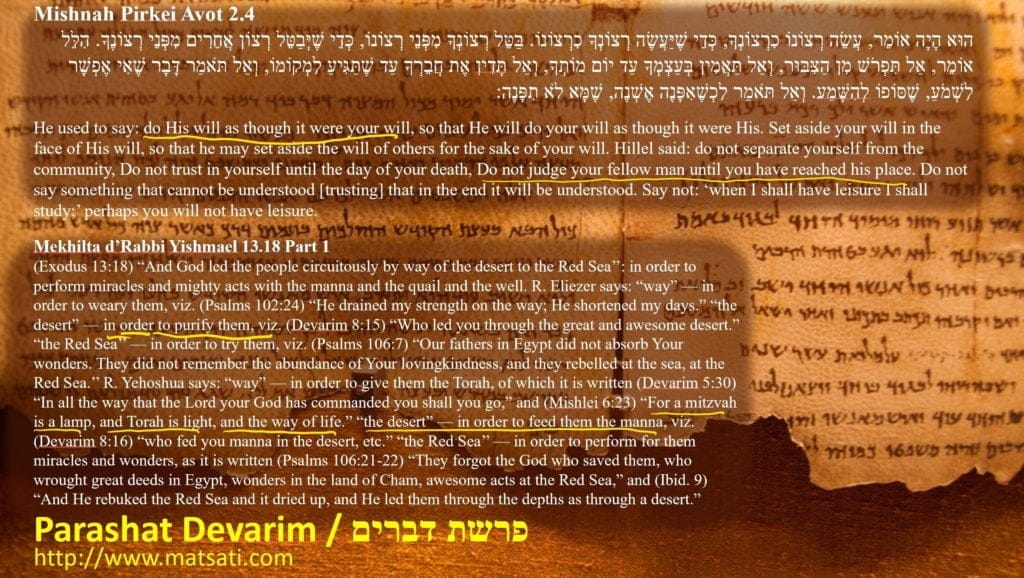
Mishnah Pirkei Avot 2.4
הוּא הָיָה אוֹמֵר, עֲשֵׂה רְצוֹנוֹ כִרְצוֹנְךָ, כְּדֵי שֶׁיַּעֲשֶׂה רְצוֹנְךָ כִרְצוֹנוֹ. בַּטֵּל רְצוֹנְךָ מִפְּנֵי רְצוֹנוֹ, כְּדֵי שֶׁיְּבַטֵּל רְצוֹן אֲחֵרִים מִפְּנֵי רְצוֹנֶךָ. הִלֵּל אוֹמֵר, אַל תִּפְרֹשׁ מִן הַצִּבּוּר, וְאַל תַּאֲמִין בְּעַצְמְךָ עַד יוֹם מוֹתְךָ, וְאַל תָּדִין אֶת חֲבֵרְךָ עַד שֶׁתַּגִּיעַ לִמְקוֹמוֹ, וְאַל תֹּאמַר דָּבָר שֶׁאִי אֶפְשָׁר לִשְׁמֹעַ, שֶׁסּוֹפוֹ לְהִשָּׁמַע. וְאַל תֹּאמַר לִכְשֶׁאִפָּנֶה אֶשְׁנֶה, שֶׁמָּא לֹא תִפָּנֶה:
He used to say: do His will as though it were your will, so that He will do your will as though it were His. Set aside your will in the face of His will, so that he may set aside the will of others for the sake of your will. Hillel said: do not separate yourself from the community, Do not trust in yourself until the day of your death, Do not judge your fellow man until you have reached his place. Do not say something that cannot be understood [trusting] that in the end it will be understood. Say not: ‘when I shall have leisure I shall study;’ perhaps you will not have leisure.
The Mishnah speaks of setting our will aside for the will of God. The rabbis also speak of trusting in the Lord over ourselves, not judging a fellow man until we have walked in his footsteps, and don’t put off the study of God’s Word! There is a lot of application here to this week’s Torah portion, as we are looking at these events and wondering why trusting in God was so difficult, when we have not walked in their footsteps, teaching us as the Mishnah is saying, do not judge. (see also Matthew 7:1-2) The Lord God Almighty chose to lead the people in דֶּרֶךְ הַמִּדְבָּר “the way of the desert” such that they would learn to depend upon Him to meet their needs as the Scriptures state, לְמַ֣עַן הוֹדִֽעֲךָ֗ כִּ֠י לֹ֣א עַל־הַלֶּ֤חֶם לְבַדּוֹ֙ יִחְיֶ֣ה הָֽאָדָ֔ם כִּ֛י עַל־כָּל־מוֹצָ֥א פִֽי־יְהוָ֖ה יִחְיֶ֥ה הָאָדָֽם “such that you would know that it is not by bread alone that sustains a man, but everything that proceeds from the mouth of God that sustains a man.” (Devarim / Deuteronomy 8:3 וַֽיְעַנְּךָ֮ וַיַּרְעִבֶךָ֒ וַיַּֽאֲכִֽלְךָ֤ אֶת־הַמָּן֙ אֲשֶׁ֣ר לֹא־יָדַ֔עְתָּ וְלֹ֥א יָדְע֖וּן אֲבֹתֶ֑יךָ לְמַ֣עַן הוֹדִֽעֲךָ֗ כִּ֠י לֹ֣א עַל־הַלֶּ֤חֶם לְבַדּוֹ֙ יִחְיֶ֣ה הָֽאָדָ֔ם כִּ֛י עַל־כָּל־מוֹצָ֥א פִֽי־יְהוָ֖ה יִחְיֶ֥ה הָאָדָֽם׃) We note while the people were in the wilderness, we are told, לֹא-יָמִישׁ עַמּוּד הֶעָנָן יוֹמָם וְעַמּוּד הָאֵשׁ לָיְלָה לִפְנֵי הָעָם “the pillar of cloud by day, and the pillar of fire by night, did not depart from before the people.” (Shemot / Exodus 13:22) This means the presence of God remained as He led them; they could see God’s presence. According to Shemot / Exodus there was a daily reminder that God was in their midst, and yet they did not trust in Him. According to the Mekhilta, there was a purpose for דֶּרֶךְ הַמִּדְבָּר “the way of the desert.”
Mekhilta d’Rabbi Yishmael 13.18 Part 1
ויסב אלהים את העם – כדי לעשות נסים וגבורות במן ובשליו ובבאר. ר’ אליעזר אומר: כדי ליגעם, שנאמר (תהלים קב) “ענה בדרך כחי קצר ימי” וגו’. המדבר – כדי לצרפן, שנאמר (דברים ח) “המוליכך במדבר הגדול והנורא”. ים סוף – כדי לנסותם, שנאמר (תהלים קו) “אבותינו במצרים לא השכילו נפלאותיך” וגו’. רבי יהושע אומר: דרך – כדי ליתן להם את התורה, שנאמר (דברים ה) “בכל הדרך אשר צוה ה’ אלהינו אתכם תלכו”, ואומר (משלי ו) “כי נר מצוה ותורה אור”. המדבר – כדי להאכילם את המן, שנאמר (דברים ח) “המאכילך מן במדבר” וגו’. ים סוף – כדי לעשות להם נסים ונפלאות, שנאמר (תהלים קו) “שכחו אל מושיעם עושה גדולות” וגו’, ואומר (שם) “ויגער בים סוף ויחרב ויוליכם בתהומות כמדבר”:
(Exodus 13:18) “And God led the people circuitously by way of the desert to the Red Sea’’: in order to perform miracles and mighty acts with the manna and the quail and the well. R. Eliezer says: “way” — in order to weary them, viz. (Psalms 102:24) “He drained my strength on the way; He shortened my days.” “the desert” — in order to purify them, viz. (Devarim 8:15) “Who led you through the great and awesome desert.” “the Red Sea’’ — in order to try them, viz. (Psalms 106:7) “Our fathers in Egypt did not absorb Your wonders. They did not remember the abundance of Your lovingkindness, and they rebelled at the sea, at the Red Sea.’’ R. Yehoshua says: “way” — in order to give them the Torah, of which it is written (Devarim 5:30) “In all the way that the Lord your God has commanded you shall you go,” and (Mishlei 6:23) “For a mitzvah is a lamp, and Torah is light, and the way of life.” “the desert” — in order to feed them the manna, viz. (Devarim 8:16) “who fed you manna in the desert, etc.” “the Red Sea’’ — in order to perform for them miracles and wonders, as it is written (Psalms 106:21-22) “They forgot the God who saved them, who wrought great deeds in Egypt, wonders in the land of Cham, awesome acts at the Red Sea,” and (Ibid. 9) “And He rebuked the Red Sea and it dried up, and He led them through the depths as through a desert.”
Through discussion, the rabbis provide various reasons for God’s choice of דֶּרֶךְ הַמִּדְבָּר “the way of the desert.” For miracles, for draining strength so as to purify them (like removing their pride), for remembering the great abundance of his grace, for the giving of Torah, for feeding them His Word symbolized by bread, and for remembering the miracles God performed in His delivering and redeeming them. This process of דֶּרֶךְ הַמִּדְבָּר “the way of the desert” appears to be like a pruning process for the people in order to refine them. (Isaiah 48:10, Malachi 3:3) We note how consistent this teaching is with what we find in the Apostolic Writings according to John 15.
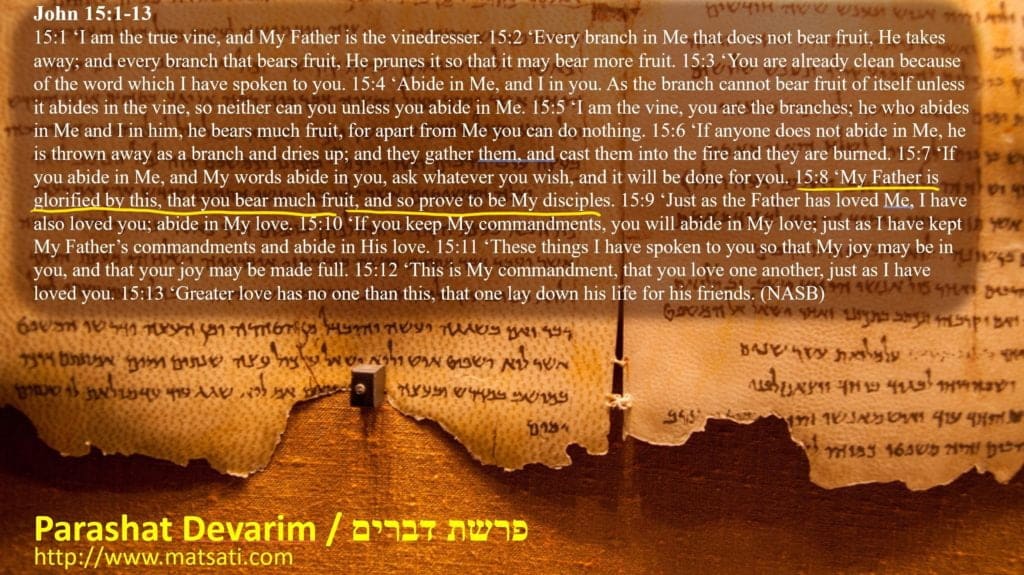
John 15:1-13
15:1 ‘I am the true vine, and My Father is the vinedresser. 15:2 ‘Every branch in Me that does not bear fruit, He takes away; and every branch that bears fruit, He prunes it so that it may bear more fruit. 15:3 ‘You are already clean because of the word which I have spoken to you. 15:4 ‘Abide in Me, and I in you. As the branch cannot bear fruit of itself unless it abides in the vine, so neither can you unless you abide in Me. 15:5 ‘I am the vine, you are the branches; he who abides in Me and I in him, he bears much fruit, for apart from Me you can do nothing. 15:6 ‘If anyone does not abide in Me, he is thrown away as a branch and dries up; and they gather them, and cast them into the fire and they are burned. 15:7 ‘If you abide in Me, and My words abide in you, ask whatever you wish, and it will be done for you. 15:8 ‘My Father is glorified by this, that you bear much fruit, and so prove to be My disciples. 15:9 ‘Just as the Father has loved Me, I have also loved you; abide in My love. 15:10 ‘If you keep My commandments, you will abide in My love; just as I have kept My Father’s commandments and abide in His love. 15:11 ‘These things I have spoken to you so that My joy may be in you, and that your joy may be made full. 15:12 ‘This is My commandment, that you love one another, just as I have loved you. 15:13 ‘Greater love has no one than this, that one lay down his life for his friends. (NASB)
We note that the rabbinic concept of דֶּרֶךְ הַמִּדְבָּר “the way of the desert” was for various reasons, one was for the purification and remembering the grace of God. We see a parallel here in John 15 as Yeshua teaches the תּוֹרַת הַּגֶּפֶּן “Torah instruction of the vine.” Here Yeshua uses this analogy of the breaches bearing fruit, and of the one who tends the vine he has a pruning process. The reason for pruning is to enlarge and enhance the growth and size of the fruit. God who is the heavenly vine dresser is the one who is working in the lives of His people. The fruit is designed to bring glory to God and demonstrates a life that is set free from sin and bondage. This week’s Torah portion, Parashat Devarim, describes the necessity to trust in God and His ability to provide for our needs no matter what that might be. The point of דֶּרֶךְ הַמִּדְבָּר “the way of the desert” was for purging His people, purifying the heart and actions of His people so that they could trust in Him and give their will over to God as opposed to living in the carnal desire as the previous generation did. What these things teach us is that suffering, challenges, and tribulation are all a part of the growing process. The one whose faith says that God will make our lives perfect without suffering, challenges, and suffering is an immature and imperfect faith that does not understand or know what the Scriptures teach! This purification process is the bringing us through these difficulties in life while maintaining our faith, and this is not by the will of man, but by the power of God! We note the power of God’s Word as Yeshua said in John 15:3 ‘You are already clean because of the word which I have spoken to you. (NASB) This sanctification, this separation, this setting apart as holy unto God depends upon our willingness to commune with God and His Messiah Yeshua, and walk in His ways of righteousness and truth. This is what Yeshua meant when he said, 15:4 ‘Abide in Me, and I in you. As the branch cannot bear fruit of itself unless it abides in the vine, so neither can you unless you abide in Me. (NASB) as the connectedness to God and His Word, remaining in the Messiah, these are central truths that are being taught in the Torah, and in the Apostolic Writings, the power of God’s presence and love enters into our lives. This Torah centric truth is illustrated in this תּוֹרַת הַּגֶּפֶּן “Torah instruction of the vine” as the one who does not trust in the Lord, and remains faithful to Him, and walks in His ways, is cast off and withers. (John 15:6) We note how sin destroys! Sin destroyed an entire generation of people in the wilderness. We note that this purging process takes place in our lives too. The Lord is working to destroy the unclean things in our lives. This is why it is so important to seek the God of Israel in His son Yeshua the Messiah! We must be careful to seek the Lord and our connection with our Father in heaven through His Son Yeshua. It is by this we achieve the uttermost good for our lives as seeking and receiving the presence of God as we walk in all of His ways according to His Word!
